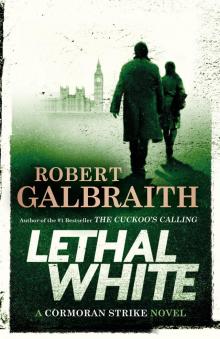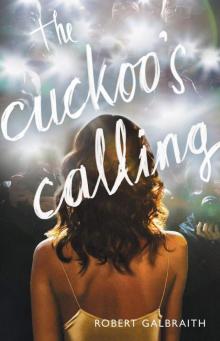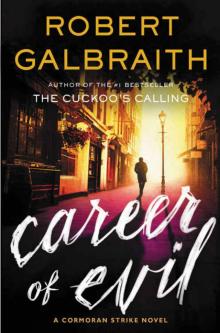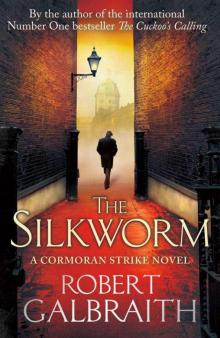- Home
- Robert Galbraith
Career of Evil Page 27
Career of Evil Read online
Page 27
“They’re nearly all girls as well. Oldest boy’s fourteen.”
“How would the police feel about me seeing Hazel?” Strike asked.
“We can’t stop you,” Wardle said, shrugging. “I’m for it, on the understanding that you’ll pass on anything useful, but I doubt there’s anything else there. We’ve interviewed everyone, we’ve been through Kelsey’s room, we’ve got her laptop and personally I’d bet none of the people we’ve talked to knew anything. They all thought she was off on a college placement.”
After thanks for the coffee and a particularly warm smile for Robin, which was barely returned, Wardle left.
“Not a word about Brockbank, Laing or Whittaker,” Strike grumbled as Wardle’s clanging footsteps faded from earshot. “And you never told me you’d been ferreting around on the net,” he added to Robin.
“I had no proof she was the girl who’d written the letter,” said Robin, “but I did think Kelsey might have gone online looking for help.”
Strike heaved himself to his feet, took her mug from her desk and was heading for the door when Robin said indignantly:
“Aren’t you interested in what I was going to tell you?”
He turned, surprised.
“That wasn’t it?”
“No!”
“Well?”
“I think I’ve found Donald Laing.”
Strike said nothing at all, but stood looking blank, a mug in each hand.
“You’ve—what? How?”
Robin turned on her computer, beckoned Strike over and began typing. He moved around to look over her shoulder.
“First,” she said, “I had to find out how to spell psoriatic arthritis. Then… look at this.”
She had brought up a JustGiving charity page. A man glared out of the small picture at the top.
“Bloody hell, that’s him!” said Strike, so loudly that Robin jumped. He set the mugs down and dragged his chair around the desk to look at the monitor. In doing so, he knocked over Robin’s roses.
“Shit—sorry—”
“I don’t care,” said Robin. “Sit here, I’ll clear them up.”
She moved out of the way and Strike took her place on the swivel chair.
It was a small photograph, which Strike enlarged by clicking on it. The Scot was standing on what seemed to be a cramped balcony with a balustrade of thick, greenish glass, unsmiling, with a crutch under his right arm. The short, bristly hair still grew low on his forehead, but it seemed to have darkened over the years, no longer red as a fox’s pelt. Clean-shaven, his skin looked pockmarked. He was less swollen in the face than he had been in Lorraine’s picture, but he had put on weight since the days when he had been muscled like a marble Atlas and had bitten Strike on the face in the boxing ring. He was wearing a yellow T-shirt and on his right forearm was the rose tattoo, which had undergone a modification: a dagger now ran through it, and drops of blood fell out of the flower towards the wrist. Behind Laing on his balcony was what looked like a blurry, jagged pattern of windows in black and silver.
He had used his real name:
Donald Laing Charity Appeal
I am a British veteran now suffering from psoriatic arthritis. I am raising money for Arthritis Research. Please give what you can.
The page had been created three months previously. He had raised 0 percent of the one thousand pounds he was hoping to meet.
“No rubbish about doing anything for the money,” Strike noted. “Just ‘gimme.’”
“Not give me,” Robin corrected him from the floor, where she was mopping up spilled flower water with bits of kitchen roll. “He’s giving it to the charity.”
“So he says.”
Strike was squinting at the jagged pattern behind Laing on the balcony.
“Does that remind you of anything? Those windows behind him?”
“I thought of the Gherkin at first,” said Robin, throwing the sodden towels in the bin and getting to her feet, “but the pattern’s different.”
“Nothing about where he’s living,” said Strike, clicking everywhere he could on the page to see what further information he might uncover. “JustGiving must have his details somewhere.”
“You somehow never expect evil people to get ill,” said Robin.
She checked her watch.
“I’m supposed to be on Platinum in fifteen. I’d better get going.”
“Yeah,” said Strike, still staring at Laing’s picture. “Keep in touch and—oh yeah: I need you to do something.”
He pulled his mobile out of his pocket.
“Brockbank.”
“So you do still think it might be him?” Robin said, pausing in the act of putting on her jacket.
“Maybe. I want you to call him, keep the Venetia Hall, personal injury lawyer thing going.”
“Oh. OK,” she said, pulling out her own mobile and keying in the number that he had shown her, but beneath her matter-of-fact manner she was quietly elated. Venetia had been her own idea, her creation, and now Strike was turning the whole line of inquiry over to her.
She was halfway up Denmark Street in the sunshine before Robin remembered that there had been a card with the now-battered roses, and that she had left it behind, unread.
32
What’s that in the corner?
It’s too dark to see.
Blue Öyster Cult, “After Dark”
Surrounded all day long by the sounds of traffic and loud voices, Robin did not have a good opportunity to call Noel Brockbank until five o’clock that afternoon. Having seen Platinum to work as usual, she turned into the Japanese restaurant beside the lap-dancing club and took her green tea to a quiet corner table. There, she waited for five minutes to satisfy herself that any background noises Brockbank might hear could plausibly belong to a busy office situated on a main road, and keyed in the number, her heart hammering.
It was still in service. Robin listened to it ringing for twenty seconds and then, just when she had guessed that nobody was going to pick up, somebody did.
Very heavy breathing roared down the line. Robin sat still, the mobile tight against her ear. Then she jumped, as a shrill toddler’s voice said:
“HELLO!”
“Hello?” said Robin cautiously.
In the background a woman’s muffled voice said:
“What’ve you got, Zahara?”
A scraping noise and then, much louder:
“That’s Noel’s, he’s been look—”
The line went dead. Robin lowered the phone slowly, her heart still racing. She could almost see the sticky little finger that had accidentally cut the call.
The phone began to vibrate in her hand: Brockbank’s number, calling back. She took a steadying breath and answered.
“Hello, Venetia Hall.”
“What?” said a woman’s voice.
“Venetia Hall—Hardacre and Hall,” said Robin.
“What?” said the woman again. “Did you just call this number?”
She had a London accent. Robin’s mouth was dry.
“Yes, I did,” said Robin-as-Venetia. “I’m looking for Mr. Noel Brockbank.”
“Why?”
After an almost imperceptible pause Robin said:
“Could I ask who I’m speaking to, please?”
“Why?” The woman was sounding increasingly belligerent. “Who are you?”
“My name’s Venetia Hall,” said Robin, “and I’m a lawyer specializing in personal injury compensation.”
A couple sat down in front of her and began to talk loudly in Italian.
“What?” said the woman on the end of the line again.
Inwardly cursing her neighbors, Robin raised her voice and gave the same story that she had told Holly back in Barrow.
“Money for him?” said the unknown woman, with a degree less animosity.
“Yes, if his case is successful,” said Robin. “Can I ask—?”
“How did you find out about him?”
“We came across Mr. Brock
bank’s records while we were researching other—”
“How much money?”
“That depends.” Robin took a deep breath. “Where is Mr. Brockbank?”
“At work.”
“Can I ask where—?”
“I’ll get him to call you. This number, yeah?”
“Yes, please,” said Robin. “I’ll be here in the office tomorrow from nine.”
“Vene—Ven—what was your name?”
Robin spelled Venetia for her.
“Yeah, all right, then. I’ll get him to call. Bye, then.”
Robin rang Strike to tell him what had happened as she walked towards the Tube, but his number was engaged.
Her spirits ebbed as she descended into the Underground. Matthew would be at home by now. It felt as though it had been a long time since she had seen her ex-fiancé and she dreaded their reunion. Her mood sank still further as she traveled home, wishing she had a valid reason to stay away, but grudgingly obedient to her promise to Strike that she would not stay out after dark.
Forty minutes later she arrived at West Ealing station. Walking towards the flat with dread in her heart, her second attempt to call Strike went through.
“Bloody good work!” he said when she told him that she had successfully contacted Brockbank’s phone. “You say this woman had a London accent?”
“I think so,” said Robin, feeling that Strike was missing a more important point, “and a small daughter, by the sounds of it.”
“Yeah. Expect that’s why Brockbank’s there.”
She had expected him to show more concern for a child in close proximity with a man he knew to be a child rapist, but no; he briskly changed the subject.
“I’ve just been on the phone to Hazel Furley.”
“Who?”
“Kelsey’s sister, remember? Who wants to meet me? I’m going to see her on Saturday.”
“Oh,” said Robin.
“Can’t do it before then—Mad Dad’s back from Chicago. Just as well. Two-Times won’t support us forever.”
Robin did not respond. She was still thinking about the toddler who had answered the phone. Strike’s reaction to that news had disappointed her.
“Are you all right?” asked Strike.
“Yes,” said Robin.
She had reached the end of Hastings Road.
“Well, I’ll see you tomorrow,” she said.
He agreed to it and hung up. Feeling unexpectedly worse for having spoken to Strike, she headed with some trepidation towards her front door.
She need not have worried. The Matthew who had returned from Masham was no longer the man who begged Robin hourly to talk to him. He slept on the sofa. Over the next three days they moved carefully around each other, Robin with cool politeness, he with an air of ostentatious devotion that tipped, at times, into parody. He hurried to wash up cups as soon as she had finished drinking from them and on Thursday morning asked her respectfully how work was going.
“Oh, please,” was Robin’s only response as she strode past him to the front door.
His family, she guessed, had told him to back off, to give her time. They had not yet discussed how they were going to tell everyone else that the wedding was off: Matthew clearly did not wish to have that discussion. Day to day, Robin stopped short of initiating the conversation. Sometimes she asked herself whether this cowardice revealed her own secret desire to put her ring back on. At others, she was sure that her reluctance sprang from exhaustion, disinclination for what she knew would be the worst and most painful confrontation yet, and a need to marshal her forces before the final break. Little though she had encouraged her mother’s forthcoming visit, Robin was subconsciously hoping to draw enough strength and comfort from Linda to do what had to be done.
The roses on her desk shriveled slowly. Nobody had bothered to put them in fresh water, so they died quietly in the wrappings in which they had arrived, but Robin was not there to throw them out and Strike, who visited the office infrequently to fetch things, felt it would be out of place for him to dispose of them, or of the still-unopened card.
After the previous week of regular contact Robin and Strike had resumed a work pattern that meant they rarely saw each other, taking it in turns to follow Platinum and Mad Dad, who had returned from America and immediately resumed the stalking of his young sons. On Thursday afternoon they discussed by phone the question of whether Robin should try Noel Brockbank again, because he had still not called her back. After consideration, Strike told her that Venetia Hall, busy lawyer, would have other fish to fry.
“If he hasn’t contacted you by tomorrow you can try again. That’ll be a full working week. Course, his lady friend might have lost the number.”
When Strike had hung up, Robin resumed her wanderings in Edge Street in Kensington, which was where Mad Dad’s family lived. The location did nothing to lift Robin’s spirits. She had begun looking online for somewhere else to live, but the places she would be able to afford on the salary Strike paid her were even worse than she had feared, single rooms in shared houses the best she could expect.
The beautiful Victorian mews houses that surrounded her, with glossy front doors, leafy climbing plants, window boxes and bright sash windows, spoke of the comfortable, prosperous existence to which Matthew had aspired back in the days that Robin seemed ready to embrace a more lucrative career. She had told him all along that she did not care about money, or at least not as much as he did, and that remained true, but it would be a strange human being, she thought, who could linger among these pretty, quiet houses and not compare them, to the others’ detriment, with “small room in strictly vegan household, mobile phone tolerated if used in bedroom” that was just within her price range, or the cupboard-sized room in Hackney in “friendly and respectful household ready to TAKE YOU ON BOARD!”
Her mobile rang again. She tugged the phone out of her jacket pocket, expecting Strike, and her stomach turned over: Brockbank. Taking a deep breath, she answered.
“Venetia Hall.”
“You th’lawyer?”
She did not know what she had expected him to sound like. He had taken monstrous form in her mind, this rapist of children, the long-jawed thug with his broken bottle and what Strike believed to be fake amnesia. His voice was deep and his accent, though by no means as thick as his twin’s, remained distinctly Barrovian.
“Yes,” said Robin. “Is that Mr. Brockbank?”
“Aye, tha’s righ’.”
The quality of his silence was somehow threatening. Robin hastened to tell her fictitious story of the compensation that might await him if he were happy to meet her. When she had finished, he said nothing. Robin held her nerve, because Venetia Hall had the self-confidence not to rush to fill a silence, but the crackling of the slack line between them unnerved her.
“An’ where did you find ou’ abou’ us, eh?”
“We came across your case notes while we were investigating—”
“Investigatin’ wha’?”
Why did she have such a feeling of menace? He couldn’t be anywhere near her, but she scanned her surroundings all the same. The sunny, gracious street was deserted.
“Investigating similar non-combat-related injuries to other servicemen,” she said, wishing that her voice had not risen to such a high pitch.
More silence. A car rolled towards her round the corner.
Damn it, Robin thought desperately as she realized that the driver was the obsessive father she was supposed to be observing covertly. He had looked her full in the face as she turned towards his car. She ducked her head and walked slowly away from the school.
“So wha’ do I ’ave ter do then, eh?” asked Noel Brockbank in her ear.
“Could we meet and have a chat about your history?” Robin asked, her chest actually painful, so fast was her heart pounding.
“I though’ you’d read our ’istory?” he said and the hairs on the back of Robin’s neck stood up. “A cun’ called Cameron Strike gave us brai
n damage.”
“Yes, I saw that in your file,” said Robin breathlessly, “but it’s important to take a statement so we can—”
“Take a statemen’?”
There was a pause that felt suddenly dangerous.
“Sure you’re no’ a horney?”
Robin Ellacott, northerner, understood; Venetia Hall, Londoner, almost certainly would not. “Horney” was the Cumbrian word for policeman.
“Not a what—I’m sorry?” she said, doing her best to sound politely confused.
Mad Dad had parked outside his estranged wife’s house. Any moment now, his sons would be leaving with their nanny for a play date. If he accosted them, Robin needed to photograph the encounter. She was falling down on the paying job: she ought to be photographing Mad Dad’s movements.
“Police,” said Brockbank aggressively.
“Police?” she said, still striving for that tone of mingled disbelief and amusement. “Of course not.”
“You sure abou’ tha’, are you?”
The front door of Mad Dad’s wife’s house had opened. Robin saw the nanny’s red hair and heard a car door open. She forced herself to sound offended and confused.
“Yes, of course I am. Mr. Brockbank, if you’re not interested—”
Her hand was slightly damp on the phone. Then, taking her by surprise, he said:
“All right, I’ll mee’ you.”
“Excellent,” said Robin as the nanny led the two little boys onto the pavement. “Whereabouts are you?”
“Shoreditch,” said Brockbank.
Robin felt every nerve tingle. He was in London.
“So, where would be convenient to—?”
“Wha’s tha’ noise?”
The nanny was screaming at Mad Dad, who was advancing on her and the boys. One of his sons began wailing.
“Oh, I’m actually—it’s just my day for picking up my son from school,” said Robin loudly over the background shrieks and shouts.
Silence again on the end of the line. Matter-of-fact Venetia Hall would surely break it, but Robin found herself paralyzed by what she tried to tell herself was an irrational fear.
Then he spoke in a voice more menacing than Robin had ever heard, the more so because he half crooned the words, so close to the receiver that he seemed to be breathing into her ear.

 Lethal White
Lethal White The Cuckoo's Calling
The Cuckoo's Calling Career of Evil
Career of Evil The Silkworm
The Silkworm